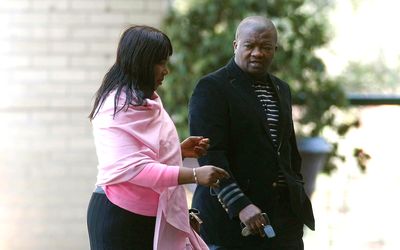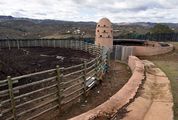BANTU Holomisa turned 60 on Saturday. His family invited many of the people who have known him over the years to celebrate the occasion with him, and it was a fitting occasion for the man.
The first time he obtained prominence in my eyes was in January 1987 when a news item on the then Radio Transkei nearly knocked my grandmother’s morning cup of tea out of hand. He had been arrested on as yet unknown charges but would be held under the homeland’s security laws that allowed detention without trial.
She was angry, gutted. He was her nephew and she knew, as only mothers do, that he was raised well, and that whatever the Kaizer Matanzima government had arrested him for had to do with preventing someone from doing something wrong.
At the time, he was a 31-year-old upstart army officer, a brigadier and chief of staff. He spent some months in detention. It turned out that the apartheid government and the former Rhodesian Special Forces types who ran the Transkei Defence Force had become fed up with his opposition to attempts to include the homeland army in a wider scheme to frustrate the struggle.
Of course, Holomisa was not alone. A cohort of young army officers were not prepared to be the stooges of the apartheid government. In April that year, they forced his release from prison and the Rhodesian contingent was ejected from the homeland. By October, the same army had overthrown the homeland government of Princess Stella Sigcau, the late former minister of public enterprises.
The same motivations for her overthrow, which Holomisa shared with the Truth and Reconciliation Commission (TRC), were to bring him into direct conflict with the ANC. He was later expelled. Until that disagreement it had been unthinkable that he, a trusted aide of President Nelson Mandela and the only homeland leader to openly support liberation movements years before Madiba came out of prison, could have so acrimonious a break-up with the party.
It is important to recall the matter that led to his expulsion. He had made the mistake of telling the TRC that he overthrew the homeland government because it was corrupt. He said Sigcau herself had received an amount of R50,000, this being the proceeds of a bribe paid by hotel mganate Sol Kerzner to the Matanzima brothers for distribution among key ministers in the homeland cabinet.
By the time he repeated this well-known fact, the ANC was in charge, Sigcau was a minister and Kerzner was a benefactor, with his warrant of arrest on the same charge having been conveniently forgotten.
He could have apologised, as many including Deputy President Cyril Ramaphosa, urged him to. He refused and left the liberation movement.
To say there was a vicious character assassination aimed at destroying his credibility would be an understatement. The party branded him an agent of apartheid, something many of those who said it loudest never quite believed. But the party had spoken and he had to be taught a lesson.
On Saturday night, two things were instantly noticeable.
The first was how many ANC people there were. Time heals, I guess, and the affection for the general was genuine and touching.
The second was how speaker after speaker praised his ethical fortitude and integrity. The intensity of the applause was telling.
"One thing I can tell you is that in all the decades I have known Bantu Holomisa, he never told me a lie, not once," said his former teacher, advocate Dumisa Ntsebeza.
"For him there is only black and white, nothing in between. This has put him in trouble many times, but he is a man who sticks to his beliefs," said the Deputy Labour Minister, Inkosi Phathekile Holomisa.
So why am I telling you all of this? Prince Mlimandlela Ndamase, for whom Holomisa is a father figure, put things in perspective. He told the room how much at this juncture the country needed people of unwavering ethical standing.
Holomisa is not the only one, of course. There are many, but the majority have chosen silence over the unpopularity and insults that accompany owning your beliefs. They have yielded the space to the crude spin masters who tell us the Nkandla expenditure was entirely warranted, for instance.
It is the same people who refuse to acknowledge in public the patently obvious disarray in state-owned enterprises and other government institutions, but will do it in private, where it means nothing.
It would be tragic to expect 60-year-olds to again fight for a better country and future. The people who should be doing it — my generation and those after — do not want to risk the comfortable spoils of freedom to secure that freedom.
One day Holomisa shall pass on, and on the ruins of a country that once was we shall eulogise and daydream about what we could have been if people like him were given due recognition in our politics. I hope that lament never comes to pass.

Makaziwe Mandela and Bantu Holomisa. Picture: REUTERS
BANTU Holomisa turned 60 on Saturday. His family invited many of the people who have known him over the years to celebrate the occasion with him, and it was a fitting occasion for the man.
The first time he obtained prominence in my eyes was in January 1987 when a news item on the then Radio Transkei nearly knocked my grandmother’s morning cup of tea out of hand. He had been arrested on as yet unknown charges but would be held under the homeland’s security laws that allowed detention without trial.
She was angry, gutted. He was her nephew and she knew, as only mothers do, that he was raised well, and that whatever the Kaizer Matanzima government had arrested him for had to do with preventing someone from doing something wrong.
At the time, he was a 31-year-old upstart army officer, a brigadier and chief of staff. He spent some months in detention. It turned out that the apartheid government and the former Rhodesian Special Forces types who ran the Transkei Defence Force had become fed up with his opposition to attempts to include the homeland army in a wider scheme to frustrate the struggle.
Of course, Holomisa was not alone. A cohort of young army officers were not prepared to be the stooges of the apartheid government. In April that year, they forced his release from prison and the Rhodesian contingent was ejected from the homeland. By October, the same army had overthrown the homeland government of Princess Stella Sigcau, the late former minister of public enterprises.
The same motivations for her overthrow, which Holomisa shared with the Truth and Reconciliation Commission (TRC), were to bring him into direct conflict with the ANC. He was later expelled. Until that disagreement it had been unthinkable that he, a trusted aide of President Nelson Mandela and the only homeland leader to openly support liberation movements years before Madiba came out of prison, could have so acrimonious a break-up with the party.
It is important to recall the matter that led to his expulsion. He had made the mistake of telling the TRC that he overthrew the homeland government because it was corrupt. He said Sigcau herself had received an amount of R50,000, this being the proceeds of a bribe paid by hotel mganate Sol Kerzner to the Matanzima brothers for distribution among key ministers in the homeland cabinet.
By the time he repeated this well-known fact, the ANC was in charge, Sigcau was a minister and Kerzner was a benefactor, with his warrant of arrest on the same charge having been conveniently forgotten.
He could have apologised, as many including Deputy President Cyril Ramaphosa, urged him to. He refused and left the liberation movement.
To say there was a vicious character assassination aimed at destroying his credibility would be an understatement. The party branded him an agent of apartheid, something many of those who said it loudest never quite believed. But the party had spoken and he had to be taught a lesson.
On Saturday night, two things were instantly noticeable.
The first was how many ANC people there were. Time heals, I guess, and the affection for the general was genuine and touching.
The second was how speaker after speaker praised his ethical fortitude and integrity. The intensity of the applause was telling.
"One thing I can tell you is that in all the decades I have known Bantu Holomisa, he never told me a lie, not once," said his former teacher, advocate Dumisa Ntsebeza.
"For him there is only black and white, nothing in between. This has put him in trouble many times, but he is a man who sticks to his beliefs," said the Deputy Labour Minister, Inkosi Phathekile Holomisa.
So why am I telling you all of this? Prince Mlimandlela Ndamase, for whom Holomisa is a father figure, put things in perspective. He told the room how much at this juncture the country needed people of unwavering ethical standing.
Holomisa is not the only one, of course. There are many, but the majority have chosen silence over the unpopularity and insults that accompany owning your beliefs. They have yielded the space to the crude spin masters who tell us the Nkandla expenditure was entirely warranted, for instance.
It is the same people who refuse to acknowledge in public the patently obvious disarray in state-owned enterprises and other government institutions, but will do it in private, where it means nothing.
It would be tragic to expect 60-year-olds to again fight for a better country and future. The people who should be doing it — my generation and those after — do not want to risk the comfortable spoils of freedom to secure that freedom.
One day Holomisa shall pass on, and on the ruins of a country that once was we shall eulogise and daydream about what we could have been if people like him were given due recognition in our politics. I hope that lament never comes to pass.






















Post a comment